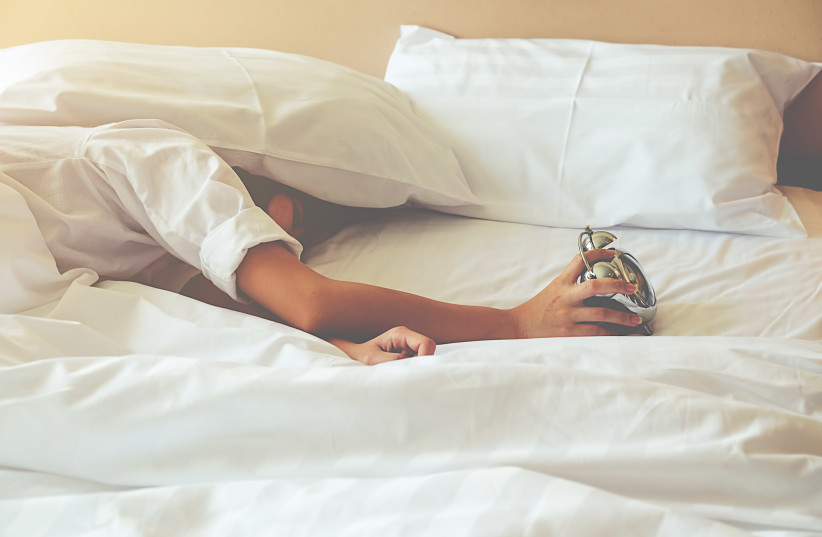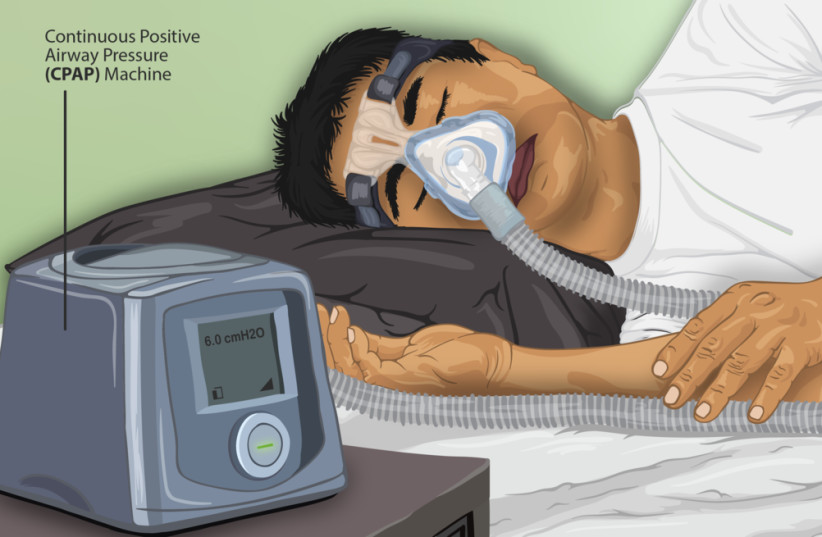Sleep apnea: What are the symptoms, causes and dangers? - explainer
What is sleep apnea? What are its symptoms and warning signs? Is it hereditary? Is it curable? Here's everything you need to know about his potentially deadly sleep disorder.
Sleep apnea is a potentially serious disorder in which one's breathing is either shallow or stops during sleep.
It can be caused by a number of factors, is a risk factor for other conditions and can even potentially cause death in its own right.
While the condition remains a serious issue for those affected, various innovations and advancements in the health sector have led to several treatments being developed.
But what is sleep apnea? What are its symptoms and warning signs? Is it hereditary? Is it curable?
Here is everything you need to know.
What are the warning signs and symptoms of sleep apnea?
The most commonly noted warning signs of sleep apnea are loud snoring and feeling tired during the day despite a full night's sleep.
As noted by the Mayo Clinic, some of the most common sleep apnea symptoms are as follows:
- Loud snoring
- Headaches when waking up in the morning
- Waking up with a dry mouth
- Insomnia, meaning difficulty staying asleep at night
- Hypersomnia, meaning excessive sleepiness during the day
- Irritability
- Difficulties in paying attention
- Gasping for air to breathe while asleep
- Instances of not breathing during sleep
It should be noted that there are actually three kinds of sleep apnea.
- Obstructive sleep apnea, which is when throat muscles relax, causing a blockage of airflow and interrupting breathing.
- Central sleep apnea, which is when the brain doesn't send the right signals to the proper muscles for breathing, resulting in breathing just stopping.
- Complex sleep apnea syndrome, which is a combination of the other two.
Of these three, obstructive sleep apnea is by far the most common.
What is the main cause of sleep apnea? Is sleep apnea hereditary?
A number of factors can lead to sleep apnea, which can be hereditary. These include, but are not limited to:
- Having a narrow airway, which can be caused by genetics, having a thicker neck or something like tonsils.
- Being male, as men are two-to-three times more likely to have sleep apnea, though women can have sleep apnea and the risk rises after menopause.
- Being older, as sleep apnea can happen to anyone but is still far more common among older adults.
- Smoking tobacco, as smokers are three times more likely to have sleep apnea due to smoking increasing upper airway inflammation and fluid retention.
- Having nasal congestion, difficulty breathing through the nose, either due to a bodily problem or allergies or another condition.
- A family history of sleep apnea.
- Using substances that can relax throat muscles, such as tranquilizers, sedatives or alcohol.
- Using narcotic pain medication, especially opioids, can impact the brain and possibly risk developing central sleep apnea.
- Post-operation complications.
- Obesity and excessive weight can result in fat deposits around the upper airway, thereby causing breathing to be obstructed.
In addition, a number of preexisting medical conditions can become a major risk factor for developing sleep apnea. These include, but are not limited to:
- High blood pressure
- Parkinson's disease
- Hormonal disorders
- Having had a stroke
- Asthma or other chronic lung diseases
- Congestive heart failure
- Polycystic ovary syndrome
How serious is sleep apnea? Can you die from sleep apnea?
Sleep apnea can be very serious, especially if it goes untreated. But the effects can be divided into two categories: immediate effects and long-term effects.
In terms of immediate effects, yes, sleep apnea can kill you, especially central sleep apnea, which can cause sudden death due to a cessation of breathing.
However, sleep apnea can also trigger seizures due to shortness of breath and resulting drops of blood in oxygen. But that's just in normal cases. In patients who have seizure disorders, like epilepsy, sleep apnea can make it worse and trigger seizures despite the use of medications. Other patients with preexisting conditions, like coronary art disease, can suffer from immediate heart attacks and other conditions due to the drop in blood oxygen.
In terms of long-term effects, there are the effects directly caused by sleep apnea and the other conditions it can lead to.
Repeatedly waking up at night due to sleep apnea can lead to sleep never being restful. As a result, it can cause drowsiness, fatigue and irritability during the day.
Due to sleep apnea resulting in sudden drops in oxygen blood levels, blood pressure will subsequently increase. This can result in high blood pressure and heart problems, which also can result in sudden death from an irregular heartbeat caused by low blood oxygen in heart disease patients.
Sleep apnea also can lead to developing type 2 diabetes and metabolic syndrome and can lead to nonalcoholic fatty liver disease complete with scarring. It can also lead to future complications in surgery and other medications.
For those with partners who sleep in the same bed, sleep apnea can become a major issue, as loud snoring can stop your partner from sleeping easily.
Sleep apnea can also lead to a higher risk of stroke and, as a recent study noted, a higher risk of contracting severe COVID-19.
Another long-term consequence of sleep apnea is memory issues, due to a lack of oxygen going to the brain.
How do you treat sleep apnea? Is sleep apnea curable?
Thankfully there are ways of treating sleep apnea. However, it isn't necessarily simple or easy, as it can likely require severe lifestyle changes. This will include behavioral therapy and efforts to stop smoking and stop taking certain medications.
For one thing, an important step in treating sleep apnea is weight loss, as being overweight can heavily restrict the airway when sleeping. And this is severe weight loss, too, with some estimating it must be between 25-30% of all body weight. This might require special weight loss surgery, like bariatric surgery.
Another tip is to sleep on one's side rather than on one's back, as in general, this can be a very cost-effective treatment, but this won't work for anyone.
Another method for treating sleep apnea is through the use of a special device known as continuous positive airway pressure (CPAP). This involves wearing a plastic mask on one's face which is linked to a machine with the goal of splinting airways open with pressurized air.
However, not everyone finds it effective at treating sleep apnea and it can be very uncomfortable.
Another method is a minimally invasive orthodontic treatment called palatal expansion, which is able to increase airflow by making the nasal cavity bigger.
Other devices meant to help sleep apnea include a mandibular advancement splint, which shifts the jaw to open up the airway, and a nasal EPAP, which tries to create airway pressure from one's own breath to stop obstructions.
In cases where CPAP and palatal expansions aren't helpful for treating sleep apnea, there are surgical options. However, there are a few different kinds, which hinge on where the airflow is obstructed.
However, these surgeries come with risks and aren't guaranteed to work for everyone.
Jerusalem Post Store
`; document.getElementById("linkPremium").innerHTML = cont; var divWithLink = document.getElementById("premium-link"); if (divWithLink !== null && divWithLink !== 'undefined') { divWithLink.style.border = "solid 1px #cb0f3e"; divWithLink.style.textAlign = "center"; divWithLink.style.marginBottom = "15px"; divWithLink.style.marginTop = "15px"; divWithLink.style.width = "100%"; divWithLink.style.backgroundColor = "#122952"; divWithLink.style.color = "#ffffff"; divWithLink.style.lineHeight = "1.5"; } } (function (v, i) { });


